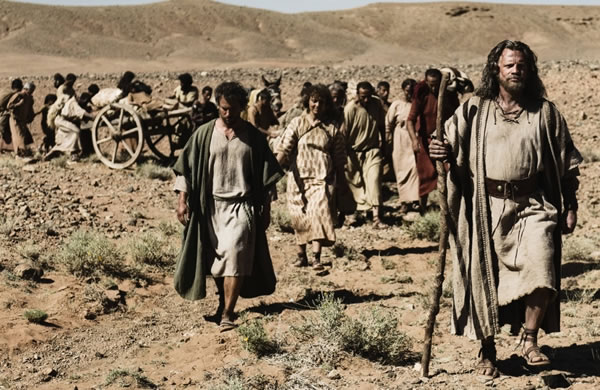Exodus 3:7-8 (NASB)
(7) The LORD said, “I have surely seen the affliction of My people who are in Egypt, and have given heed to their cry because of their taskmasters, for I am aware of their sufferings.
(8) So I have come down to deliver them from the power of the Egyptians, and to bring them up from that land to a good and spacious land, to a land flowing with milk and honey, to the place of the Canaanite and the Hittite and the Amorite and the Perizzite and the Hivite and the Jebusite.
WHAT DOES IT SAY?
- The LORD said I have SURELY seen the affliction of MY people
I Have given heed to their cry because of taskmasters
I AM AWARE of their sufferings
- SO I HAVE COME to deliver from the Egyptians
to bring them to a spacious land flowing with milk and honey
to the place of Canaanite, Hittite, Amorite, Perizzite, Hivite
What Does it Mean?
Suffering and affliction: these are two words we do not jump up and down about, but they’re words we can all relate to. Here in Exodus chapter 3, God has heard the cries of His people in Egypt, and so He has come to Moses to inform him of what is going on in Egypt.
Moses’ face is in the dirt; he is not speaking, God is speaking. I think that’s something, don’t you? Moses obviously has an opinion about what’s been happening to the Hebrews in Egypt, don’t you think? I mean, the reason Moses finds himself there in the desert at all is because he has seen an Egyptian beating a Hebrew slave to death and he has subsequently murdered the Egyptian in a heated outburst of anger. The treatment of the slaves bothers Moses so much, it has led him to commit murder.
Don’t you wonder if Moses had heard about this “God of the Hebrews” and questioned whether He had any real power at all? Why hadn’t God intervened? Why hadn’t He stopped all these atrocities from happening? I think Moses legitimately thought he knew the depth of it all. Being a prince of Egypt, he’d had a “behind the scenes” view and had actually come to a place where he had refused to be called the son of the Pharaoh’s daughter (see Hebrews 11:24). Yet even at this point Moses still doesn’t know the depth of the brokenness of the Hebrews in Egypt, so God informs him.
The word for affliction is “oiny” which means much more than just physical abuse. God is informing Moses that His people have suffered tremendous physical, emotional and mental abuse at the hands of the Egyptians and are crying out from the depths of their souls to be #delivered from Egypt. The word aware is, “Ra’ah,” which means God more than knows what the affliction is; it is as if it had been done to Him.
God sees the injustices. God sees the pain; He walks with us in it, because He understands what it takes to have victory in it. I don’t like that. I want God to protect me from it, not walk with me in it.
I love how in Exodus 3:8 God tells Moses, “SO I HAVE COME to deliver” (emphasis added). God is not asking Moses to use his contacts in Egyptian politics or to use his power as a son of the Pharaoh’s daughter. God is telling Moses, I AM is going to deliver them. Moses, with his face in the dirt, probably feels more useless than ever: his relevance in Egyptian culture has long passed, he is wanted on a murder charge for which he is guilty, and he has no idea how to even begin to help a people that are that broken and hurting. What could Moses say? What could he do? Moses can do nothing. All he brings to the table is his ability to bend his knee in the dirt to the I AM who will do the #delivering.
God came Himself. God did not trust the Hebrews to anyone else. Likewise, God did not trust you to anyone else. He came Himself. God Himself came in the form of a man: His name is Jesus. Jesus lived a perfect life and then paid the debt that a holy God requires. Jesus was stricken for us (see Isaiah 53). Jesus died a horrible, horrific and painful death on the cross so that He could walk us through the pain and suffering of this world. We pray to a God who understands all sides of the hurt.
God never acts on our time table or in the way we think is best, but when we cry out to Him, God hears, He answers, and He comes Himself.
What Does it Mean to Me?
When have you felt abandoned by God? What injustices has God seemed to have missed or not cared about in your life? In what area of your life is it time to claim that God is “the God Who Sees”? (Jehovah Roi)
When have you cried out to God with true intensity? When have you seen God act on your behalf.
What causes you to doubt that the depth of your pain matters to an Almighty God? When has anyone really understood your pain?
Who are you looking to, to deliver you? How many people have let you down or left you disappointed?
LIVE IT OUT
Today, instead of just crying out to a friend, or my mom, or a boss, I will cry out to GOD, whose name is Jehovah Roi, the God who sees. Lord, give me ears today to hear Your Word, a heart to believe Your Word and eyes to see You walk with me in this world.
Join Kendra Graham for a free Women’s Bible Study at The Cove, Tuesday evenings through February 26. The study will also be live-streamed through social media. To view a snippet of the study entitled #I Am Enough, click here.
To register for this study, please visit this link.
To watch the first session, visit this link.
Click here for a schedule of seminar, concerts, and retreats at The Cove in beautiful Asheville, NC.
Are you a Christian church or non-profit ministry looking for a place to hold your conference, retreat or ministry event? Click here for more information on holding your event at The Cove.
Visit the Chatlos Memorial Chapel, Visitors Center, and Ruth’s Prayer Garden. Click here for directions and operating hours. Tours are free.
Follow us on social media.![]()




